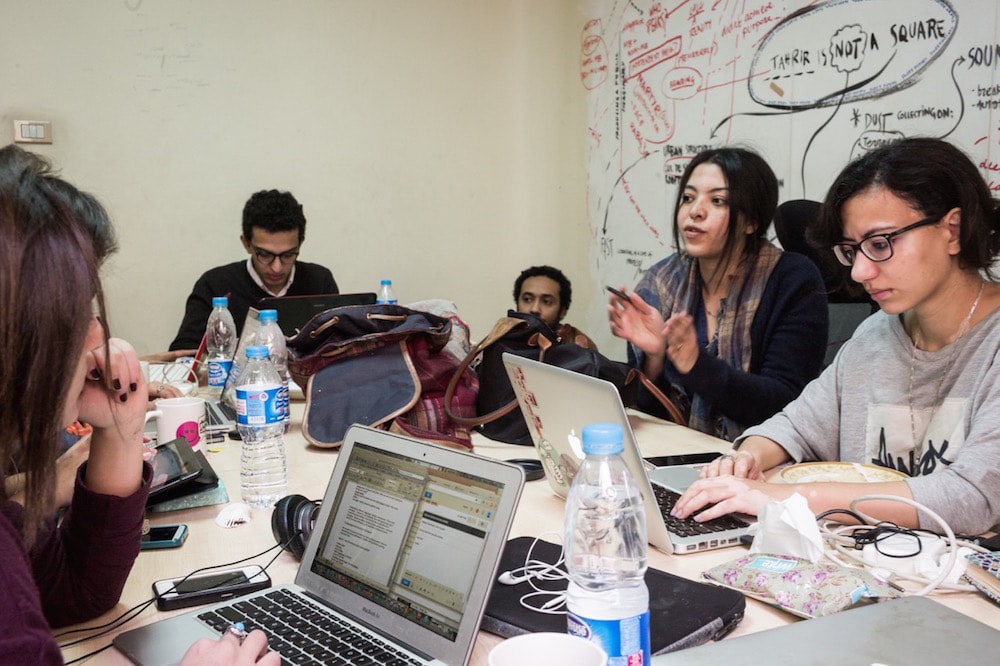As several hundred news and human rights websites continue to be blocked, Egyptian authorities targeted one of the country’s last independent voices.
This statement was originally published on hrw.org on 25 November 2019.
Egyptian security forces raided the headquarters of the Cairo-based independent news website Mada Masr on November 24, 2019, as part of the government’s suppression of media freedom in Egypt, Human Rights Watch said today.
Plainclothes security forces held journalists and media workers in Mada Masr’s headquarters for several hours and confiscated staff property. The security forces briefly detained the website’s chief editor, Lina Atallah, as well as two Egyptian and two foreign journalists, according to tweets posted by Mada Masr. The raid followed Mada Masr’s reporting on November 20 that Mahmoud al-Sisi, the son of President Abdel Fattah al-Sisi, had been removed from his position as a senior officer in the General Intelligence Service.
“The security forces’ raid on Mada Masr, one of Egypt’s last news outlets that is not a government mouthpiece, is part and parcel of President al-Sisi’s attacks on media freedom,” said Joe Stork, deputy Middle East and North Africa director at Human Rights Watch. “President al-Sisi seems intent on eliminating all independent journalism in the country.”
On November 23, the day before the raid, Egyptian authorities arrested Mada Masr journalist Shady Zalat at his home in Cairo and held him incommunicado for more than 30 hours. Security forces dumped him on the side of Cairo’s Ring Road later the next day, about the time the raid on Mada Masr’s office ended.
Mada Masr said that nine security force personnel in civilian clothes broke into the office at about 1:30 p.m. on November 24 and confiscated the staff’s laptops and mobile phones. The security forces refused to tell the staff the agency who they were with and did not present a search warrant.
Security forces detained all those in the office for several hours and refused to let lawyers in until they later escorted Attalah and her colleagues Mohamed Hamama and Rana Mamdouh to Cairo’s al-Dokki police station. The three were then taken in a police van, apparently heading to State Security Prosecution. However, the van abruptly changed course and returned them to the police station, where the three were released around 6:15 p.m.
Mada Masr tweeted that security forces escorted two foreign journalists working with Mada Masr – Ian Louie, a US citizen, and Emma Scolding, a British citizen – to their apartments, where security forces photographed the journalists’ passports. Police also briefly detained a France 24 crew that was in the Mada Masr office at the time of the raid to interview Attalah. Mada Masr tweeted that French embassy representatives attempted for an hour and a half to gain entry to Mada Masr’s office before being permitted to escort out the France 24 crew.
Late on the night of November 25, the State Security Prosecution said in a statement that the security raid occurred under a prosecutor’s direction after it received a “National Security Agency’s memo that the Muslim Brotherhood has established a website to disseminate false news and rumors to disrupt general security.” Human Rights Watch and several other organizations have documented that the National Security Agency memos consist of mere allegations by security officers without any supporting evidence. Often, these allegations constitute no recognizable offense under international law and violate basic rights.
Al-Sisi’s government has detained or imprisoned scores of journalists. About 30 journalists remain incarcerated, making Egypt among the countries with the highest number of incarcerated journalists, according to Reporters without Borders, which ranked Egypt 163 out of 180 countries for press freedom in 2019. In recent years, al-Sisi has approved several laws that further curtail freedom of expression and provide for censorship without judicial review.
The authorities have blocked the Mada Masr website as well as several hundred other news and human rights websites over the past two years without judicial orders. The authorities routinely block alternative links to access Mada Masr articles in Egypt as well.
Mada Masr is a well-regarded Arabic and English website founded in 2013 by Egyptian journalists after the weekly Egypt Independent, where they had worked, was shut down. Almost all mainstream media outlets in Egypt are either owned by companies linked to Egyptian intelligence services or by businessmen with close ties to the government. It has become routine to see major private and government newspapers print the same headlines praising the government in a style that is reminiscent of the late 1960s.



